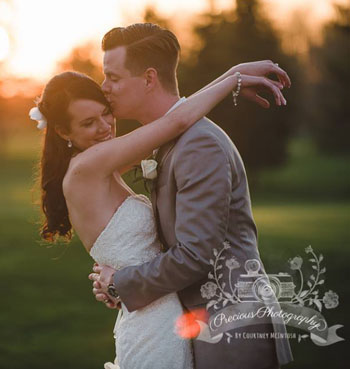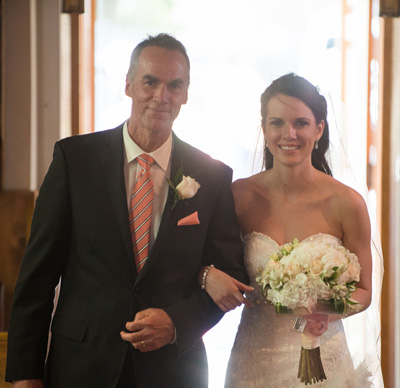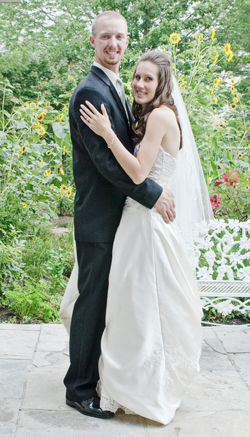
The language of religious tradition and the social advances of generations create an interesting juxtaposition when the two come together in modern day ceremony. Last Saturday, my wife and I had the honour of responding together, “we do” when asked, “who gives this woman to be married to this man?”
Long gone – at least in this part of the world – are the societal and proprietary customs under which the language was predicated centuries ago. But on this special day, the answer to the question posed by The Reverend Canon Janet Lynall at the historic and intimate St. Anne’s Anglican Church in (Byron) London, Ontario, made a pair of parental respondents very proud.

It also sent the father of the bride – after a beautiful ceremony and wonderful reception on a picture-perfect Spring day – into sentimental reflection on the process of courtship and the traditions of marriage. As the father of two married daughters, this is the second time I have taken my share of responsibility as a party who gives this woman to be married to this man. Out of the ensuing introspection, I’ve developed a few thoughts on the notion of dating and marriage from the perspective of a father of daughters.
*************************
It likely comes as no surprise that fathers tend to be a little protective of daughters once they reach the stage when suitors enter the picture. I know this from having been a participant on both sides of the equation. I married a woman from a family of four daughters and a son, almost 33 years ago, and there is a certain screening process that comes into play. The primary evaluator is usually the father, though in his absence or through his delegation, responsibilities may fall to other family members to assess the candidate in their own specific area of interest or expertise.
Either way, the father (or surrogate) is usually an integral component of prospect scrutiny, the weight of which a future son-in-law will have to successfully bear. And who can blame us? After two or three decades of supporting, teaching, encouraging, consoling, advising, celebrating, cautioning, sharing, caring, laughing with, learning from, protecting, and above all, loving daughters, a father does not take lightly the idea of subcontracting these responsibilities.
 In my case, father-in-law, Romeo – a combination of very French and very vocal – was the chief scrutineer. For the first few months, each visit to the family homestead in Pickering would be a test. Post-dinner, rec room conversation among the large family, involved Romeo taking his position on the couch directly opposite and staring intently at me, a semi-skittish swain. The penetrating gaze and impermeable interest was locked in, regardless of who in the room happened to be speaking at the time.
In my case, father-in-law, Romeo – a combination of very French and very vocal – was the chief scrutineer. For the first few months, each visit to the family homestead in Pickering would be a test. Post-dinner, rec room conversation among the large family, involved Romeo taking his position on the couch directly opposite and staring intently at me, a semi-skittish swain. The penetrating gaze and impermeable interest was locked in, regardless of who in the room happened to be speaking at the time.
As a new entrant trying to make a good impression, there were boundaries to be carefully considered: physical spacing between daughter and me (close, but not smothering); choice of language (colourful, but not offensive); aptitude (knowledgeable, but not argumentative); and personality (humourous and mildly opinionated, but not buffoonish or cocky).
Romeo was a master of assessment through gut feel and between us there was a warm bond of respect and loving kinship from those early days, to his passing in 2009.
*************************

As members of fairly large families, on both my wife’s side and my own, potential boyfriends of my daughters were subject to multiple levels of quality control: The pre-qualification by various members of the extended family, and; the all-important approval by the patriarch – who may well be guided by family feedback but as Head of the Admissions Committee, is ultimately responsible for final endorsement.
Indeed, a few hard lessons (which may be of some future use to young readers) were learned by candidates eliminated in the early relationship rounds, many years ago:
- Never borrow the father’s guitar if your fashion accessories include a large, abrasive belt buckle
- It is ill-advised to arrive in the driveway of insurance industry parents, in a vehicle with tread-bare tires
- Under no circumstances correct the French language accuracy of the girlfriend’s fluently French uncles at the family New Year’s Eve party
In the case of the two fine young men who married my daughters, the exercise was virtually stress-free and painless from the perspective of the father of the bride. Both cases involved long courtships and each eventual son-in-law quickly formed solid relations and friendships with grandparents, uncles, aunts, cousins, as well as the mother and father. Their interests aligned and personalities meshed nicely with the extended family. In both circumstances we got to know the boyfriend’s parents and could clearly see they were raised in households with the same core values we grew up with and sought to instill in our own family.
In the case of my oldest daughter, Sara, her boyfriend, Adam lived directly behind us. We had known his family since the kids were in elementary school and gotten on well with his parents for years. While this may not have been ideal for Adam, it was immensely convenient for a dating daughter’s parents.
Similarly, Erin’s husband, Dave’s parents are members of the same golf club we attend and we have formed a warm friendship with them in recent years.
We consider ourselves very fortunate in both cases, to not only experience the truth of the old adage: “you’re not losing a daughter, you’re gaining a son,” but to gain also the camaraderie and friendship of the broader families.
*************************
With a closing line pulled from the Traditional Irish Blessing chosen by the bride and groom as part of their wedding ceremony, a heartfelt wish for the newlyweds of whom we are so proud:
May you know nothing but happiness from this day forward
*************************